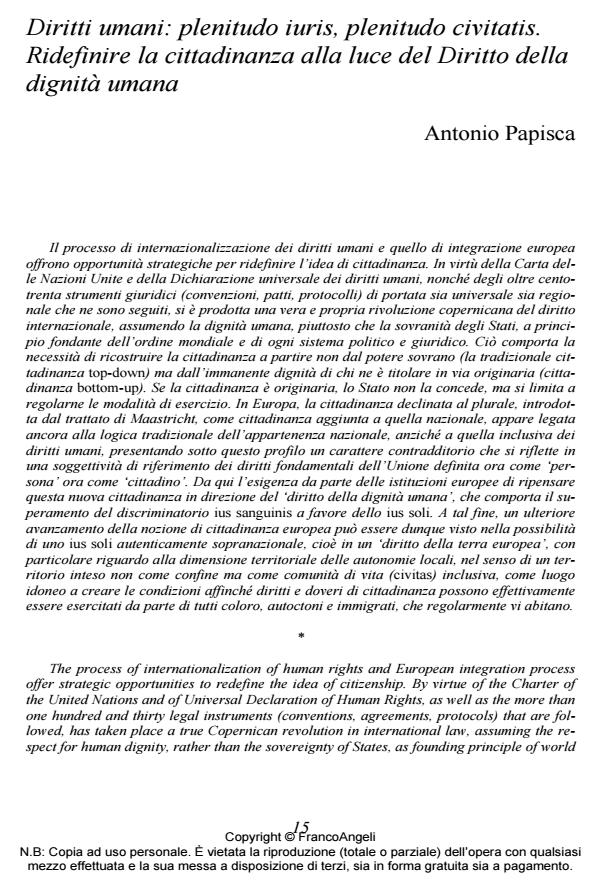Diritti umani: plenitudo iuris, plenitudo civitatis. Ridefinire la cittadinanza alla luce del Diritto della dignità umana
Journal title CITTADINANZA EUROPEA (LA)
Author/s Antonio Papisca
Publishing Year 2014 Issue 2013/1
Language Italian Pages 15 P. 15-29 File size 81 KB
DOI 10.3280/CEU2013-001002
DOI is like a bar code for intellectual property: to have more infomation
click here
Below, you can see the article first page
If you want to buy this article in PDF format, you can do it, following the instructions to buy download credits

FrancoAngeli is member of Publishers International Linking Association, Inc (PILA), a not-for-profit association which run the CrossRef service enabling links to and from online scholarly content.
The process of internationalization of human rights and European integration process offer strategic opportunities to redefine the idea of citizenship. By virtue of the Charter of the United Nations and of Universal Declaration of Human Rights, as well as the more than one hundred and thirty legal instruments (conventions, agreements, protocols) that are fol-lowed, has taken place a true Copernican revolution in international law, assuming the re-spect for human dignity, rather than the sovereignty of States, as founding principle of world order and of every political and legal system. This implies the need to rebuild citizenship starting from not the state sovereign power (the traditional top-down citizenship) but from the immanent dignity of who owns it in the original way (bottom-up citizenship). The state does not grant it, but merely regulate its exercise. In Europe, citizenship in the plural, intro-duced by the Maastricht Treaty, as citizenship added to nationality, appears bound still to the traditional logic of state belonging, instead of the logic of inclusiveness through human rights, presenting in this respect a contradictory nature that is reflected in the subjectivity of reference of UE Fundamental Rights now to the ‘person’ now to the ‘citizen’. Hence the need for the European institutions to rethink this new citizenship in the direction of the ‘law of human dignity’, thereby eliminating the discriminatory ius sanguinis in favor of ius soli. To this end, a further advancement of the concept of European citizenship can thus be seen in the possibility of a ius soli truly supranational, with particular regard to the territory of local authorties, meaning a territory to be considered not as a border but as inclusive com-munity of life (civitas), as a suitable place to create the conditions so that the rights and du-ties of citizenship can actually be exercised by anyone, natives and immigrants, who regularly live there.
Antonio Papisca, Diritti umani: plenitudo iuris, plenitudo civitatis. Ridefinire la cittadinanza alla luce del Diritto della dignità umana in "CITTADINANZA EUROPEA (LA)" 1/2013, pp 15-29, DOI: 10.3280/CEU2013-001002